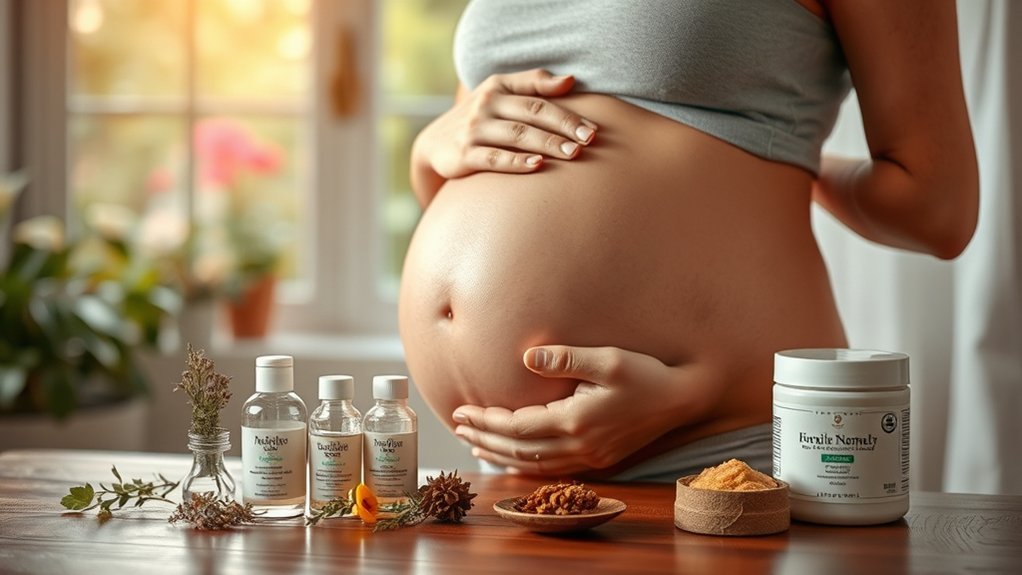Experiencing skin challenges during pregnancy is more common than you might think. Eczema can flare up due to hormonal shifts, leading to discomfort and irritation. Understanding the safe treatment options available to you is essential for managing symptoms effectively. From topical remedies to lifestyle adjustments, you’ll find various strategies to alleviate discomfort. But how do you navigate these choices while ensuring both your health and that of your baby? Let’s explore this further.
Understanding Eczema: Causes and Symptoms During Pregnancy
Eczema, a chronic inflammatory skin condition, can be particularly challenging during pregnancy due to hormonal fluctuations and increased skin sensitivity.
During this time, you may experience exacerbated symptoms, including intense itching, redness, and dry patches on various body areas. Hormonal changes can alter your immune response, potentially triggering flare-ups or making existing eczema worse.
Pregnancy can intensify eczema symptoms, leading to increased itching, redness, and dry patches due to hormonal changes.
Stress, fatigue, and environmental factors may also contribute to your skin’s condition. You might notice that common allergens or irritants, like certain fabrics or soaps, exacerbate your symptoms.
Recognizing these triggers is essential for managing your eczema effectively. Understanding your body’s reactions during pregnancy can help you identify patterns and take proactive steps to minimize discomfort while maintaining skin health.
Safe Treatment Options for Pregnant Women
When managing eczema during pregnancy, it’s essential to choose treatment options that are both effective and safe for you and your developing baby.
Topical corticosteroids, such as hydrocortisone cream, are often recommended for short-term use to reduce inflammation and itching. You should apply these sparingly and only as needed.
Non-steroidal options like calamine lotion or colloidal oatmeal baths can also provide relief without hormonal side effects.
Moisturizers are critical; use fragrance-free products to keep your skin hydrated and minimize flare-ups.
Always consult your healthcare provider before starting any new treatment to guarantee it’s appropriate for your specific condition and stage of pregnancy.
Avoid systemic treatments and certain medications that may pose risks to your baby.
Natural Remedies and Skin Care Tips
Managing skin health during pregnancy can be challenging, especially for those dealing with eczema. To support your skin, consider using natural moisturizers like coconut oil or shea butter, which can help retain moisture and soothe irritation.
Regularly apply these after bathing to lock in hydration. Incorporating oatmeal baths can also provide relief by calming inflamed skin.
Make certain to wear breathable fabrics, such as cotton, to minimize irritation. Hydration is essential, so drink plenty of water throughout the day.
Avoid known irritants, such as harsh soaps or fragrances, and opt for gentle, fragrance-free skin care products. Always patch-test new products to confirm they won’t trigger a flare-up.
These strategies can help manage your eczema symptoms effectively during pregnancy.
Lifestyle Changes to Minimize Flare-Ups
To effectively minimize flare-ups during pregnancy, adopting specific lifestyle changes can make a significant difference.
Implementing these strategies can help manage your eczema more effectively:
- Stay Hydrated: Drinking plenty of water helps maintain skin moisture and overall health.
- Wear Breathable Fabrics: Opt for loose-fitting, natural fibers like cotton to reduce irritation and allow your skin to breathe.
- Limit Hot Showers: Taking lukewarm showers instead of hot ones can prevent skin from drying out and exacerbating eczema.
- Avoid Known Triggers: Identify and steer clear of known allergens or irritants, such as certain soaps, fragrances, or fabrics that may provoke flare-ups.
When to Seek Medical Advice and Support
How do you know when it’s time to seek medical advice for eczema during pregnancy? If your symptoms worsen or don’t improve with over-the-counter treatments, it’s essential to consult your healthcare provider.
Furthermore, if you experience severe itching, redness, or swelling that disrupts your daily activities or sleep, professional guidance is necessary.
Watch for signs of infection, such as increased pain, oozing, or fever. In addition, if you’re considering prescription medications, always discuss potential risks and benefits with your doctor.
Finally, if you have concerns about how eczema might affect your pregnancy or your baby’s health, don’t hesitate to reach out. Early intervention can help manage symptoms and improve your overall well-being during this important time.
Frequently Asked Questions
Can Eczema Affect My Baby’s Health During Pregnancy?
Eczema itself doesn’t directly affect your baby’s health during pregnancy. However, managing your symptoms is essential to guarantee your comfort and minimize stress, which can indirectly impact your baby’s well-being. Always consult your healthcare provider.
Will My Eczema Worsen After Giving Birth?
Yes, your eczema might worsen after giving birth. Studies show about 50% of postpartum women experience exacerbated symptoms, often linked to hormonal changes and stress. Monitoring your skin’s condition is essential during this change.
Can I Use Makeup if I Have Eczema?
Yes, you can use makeup if you have eczema, but choose hypoallergenic, fragrance-free products. Always perform a patch test to avoid irritation, and consider consulting a dermatologist for personalized recommendations tailored to your skin’s needs.
Are There Any Specific Foods to Avoid for Eczema?
Yes, you should avoid common allergens like dairy, gluten, nuts, and shellfish. These foods can trigger eczema flare-ups in some people. Keeping a food diary helps identify personal triggers for better management of your condition.
How Can Stress Impact My Eczema During Pregnancy?
Stress can trigger or worsen your eczema during pregnancy by increasing inflammation and altering your immune response. Managing stress through relaxation techniques can help maintain skin health and reduce flare-ups effectively. Prioritizing self-care is essential.
Conclusion
To summarize, managing eczema during pregnancy requires a careful approach to treatment and self-care. Did you know that up to 30% of pregnant women experience worsening eczema symptoms due to hormonal changes? By incorporating safe treatment options, natural remedies, and lifestyle adjustments, you can effectively reduce flare-ups and maintain skin health. Always remember to consult your healthcare provider for personalized advice to guarantee both your well-being and that of your baby.
